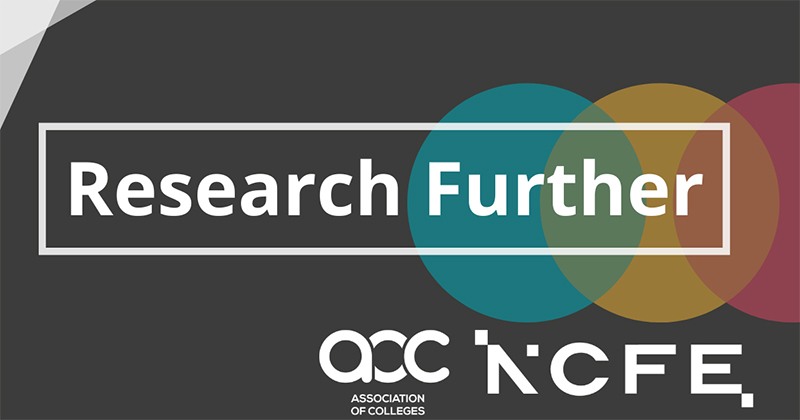Despite a lack of funds and interest from above, research in FE is being kept alive by grassroots groups of lecturers and dedicated academics. Jess Staufenberg meets the movers and shakers to find out if it’s enough
“There is no, as far as I know, ‘WonkFE’,” Phillip Augar said, from inside a cosy wooden lodge, during a virtual event with higher education think tank Wonkhe on Tuesday.
“If there is anyone out there”, continued Augar, in his talk seen by FE Week, “interested in talking to me about setting up a Further Education Policy Institute,” then could they please be in touch?
On one level, this caused some surprise. Stephen Evans, chief executive of the prolific Learning and Work Institute, tweeted there are “loads of organisations working on policy and practice in FE” (being too modest to say, not least of all his own).
But David Hughes, chief executive at the Association of Colleges, said Augar likely wanted the FE voice “to be stronger and more influential in Whitehall”.
This touches on an interesting set of questions for FE. Who is carrying out research and generating evidence-backed ideas, and how much of this is going on?
And is this research making it back to practitioners, and policymakers in the Department for Education? Perhaps Augar’s lack of awareness of the LWI reveals that problems with the status of FE research run right to the top.
First off, it’s worth looking at what the DfE has funded in schools. In 2011, the Education Endowment Foundation (EEF) was set up with a £125 million founding grant to share evidence around attainment. But it’s only for students in schools, not FE.
Then in 2016, the DfE funded the Research Schools Network, with each school getting £200,000 over three years. The next year the DfE gave £5 million to the Chartered College of Teaching, to engage teachers with the latest research.
Again, it’s only for staff in schools, not colleges (and meanwhile, FE lost its think tank dedicated to staff-led research with the closure last year of the Further Education Trust for Leadership).
Despite this, however, scratch the surface and there is lots of research going on in further education.
Kevin Orr, professor of work and learning at the University of Huddersfield, says, “there is a very committed network of researchers who work closely with practitioners.”
I soon find their names across multiple papers: Matt O’Leary at Birmingham City University, Alison Fuller and Lorna Unwin at UCL, Maggie Gregson at the University of Sunderland, Liz Atkins at the University of Derby, Jim Hordern at the University of Bath, Susan James Relly at Oxford University (taking over from Ewart Keep, a long-standing FE researcher, now retired) – and, of course, Alison Wolf at King’s College – to mention a few.

Outside universities, other organisations alongside the LWI include the Gatsby Foundation and Edge Foundation, both of which fund FE research, and EDSK think tank.
Gary Husband, visiting professor of education at the University of Sunderland, asserts, “there isn’t a lack of research in FE, there just isn’t anywhere near as much research as on compulsory education. Meanwhile, HE is really good at running research on itself!”
But Orr and Husband agree that finding big funding for FE research, and then ensuring it has impact, is a real issue.
The main government funding body for large-scale projects is the Economic and Social Research Council (ESRC), explains Orr.
“That gives very substantial grants, but they haven’t funded much FE research, and that would be really good to see more of,” he tells me. “Just given how mainstream FE is, it should be getting more mainstream funding.”
As a case in point, one of the biggest research projects in FE that is repeatedly mentioned to me dates from 20 years ago. Transforming Learning Cultures was published in 2007 by co-author David James, now a professor of sociology of education at Cardiff University, and is admiringly cited by researchers across the board for its insights into classroom and staffroom practices and how these relate to inspection and funding frameworks.
It was a large-scale project involving four universities and 16 colleges, funded by the ESRC on its £30 million Teaching and Learning Research Programme, which ran from 1999. But the TLRP was scrapped in 2009.
“There is research going on now, but there isn’t that large-scale programmatic funding for independent research, like there was with the TLRP,” James tells me.
In response, an ESRC spokesperson said it had invested £8.6 million in the Centre of Research on Learning and Life Chances for lifelong learning since 2008, and was currently funding a five-year research study, worth £2.2 million, into England’s vocational education and training around school-to-work transitions.
But even where big research does turn up important findings, it can then be difficult to translate these into a change in practice or policy, continues James. He points me to research he published in September on ‘Processes and practices of governing in colleges’.
“Our project supplies a detailed picture of what’s happening in governing boards on the ground, and comes to all sorts of recommendations, but I’m yet to meet a government minister or senior policymaker in England who’s interested,” says James.
I’ve yet to meet a government minister who’s interested
Given that the DfE regularly ignores recommendations from its own commissioned research, such as the Ney Review published in 2020, that’s little wonder, he adds.
Suzanne Straw and Lisa Morrison Coulthard, research directors at the National Foundation for Educational Research, explain that another challenge facing researchers is getting hold of the necessary datasets.
The pair are currently working on a five-year research project funded by the Nuffield Foundation examining the labour market in 2035.
“The dataset that relates to FE is the individualised learner record (ILR), but less research has been done using the ILR than the school equivalent, the national pupil database, because it’s quite complex and difficult to navigate,” explains Straw.
Another key information source is the ‘longitudinal educational outcomes’, or LEO, which shows destinations data over the course of a learner’s education career.

Coulthard warns: “It’s a very useful resource, but the level of information provided isn’t as granular as it could be.”
Olly Newton, executive director, Edge Foundation, confirms that it took his team almost five years to access LEO data for a project.
“You have to get specific access from the DfE and obviously the data security needs to be 100 per cent. It would be reasonable for it to take a couple of months, but not years and years.”
Another issue his team faces is accessing information for international comparisons, as post-Brexit the UK is no longer part of CEDEFOP (the European Centre for the Development of Vocational Training).
That’s partly why more research comparing the four home nations should be a priority, says Newton, because “it’s a natural policy laboratory”. The Edge Foundation is currently comparing inspection systems in FE across the home nations with Birmingham University, with a report out later this year.
But the government needs to clearly state it is interested in research on the FE sector, for universities and other funders to fund it properly, says Newton.
“Until that signal is there, I can understand why there wouldn’t be a push for that,” he says, adding: “It would be good to bring back calls for a ‘What Works in FE Centre’.”
It would be good to bring back calls for a ‘What Works in FE Centre’
He’s referring to when the Social Mobility Commission urged government in 2020 to create a “what works” centre for FE, with £20 million over the next five years to “translate the best available evidence” for improving outcomes for poorer students. It sounds like the FE sector’s answer to the EEF.
But when FE Week checked with the DfE, a spokesperson said: “We have no plans to create an FE What Works Centre.”
So with no formal support from government, and difficulties in getting hold of large-scale funding, the sector has been left to get on with the job of research itself.
Multiple organisations have initiatives to support practitioners in classrooms to run research.
For instance in 2014 the Edge Foundation set up an ‘early career researcher network’ to support the next generation of FE-focused PhD and other research students, with 40 on its support programme so far.
Similarly, the AoC launched its Research Further programme this academic year, funding ten FE practitioners on a PhD or masters with awarding organisation NCFE. It has also its first-ever policy manager for research and evidence, showing that research is an increasing priority for the organisation.

Finally, the ETF runs it “practitioner research programme” with about 300 practitioners achieving a masters level qualification through the programme, according to Catherine Manning, national head of mentoring and practitioner research.
It’s a strong example of how to link up academic researchers and FE practitioners, with participants getting tutorials on research methodology and being invited to attend residentials. The ETF disseminates the findings through its publication, Intuition.
But FE Week can exclusively reveal the DfE grant for the practitioner research projects will not be available in 2022-23.
An ETF spokesperson said it is “currently exploring options for these programmes and seeking alternative funding”. FE Week approached the DfE for a response.
It means grassroots research practitioners – and grassroots research colleges – are more important than ever.
As far back as 1997, former FE practitioner Andrew Morris co-founded the Learning and Skills Research Network, which links up university researchers and FE practitioners, and is still going to this day.
The entirely voluntary organisation’s national planning group is now chaired by Jo Fletcher-Saxon, assistant principal at Ashton Sixth Form College in Greater Manchester.
“This is about shining a torchlight quite specifically on an area of your practice, that an academic paper might not be able to,” says Fletcher-Saxon.
“We’ve got everything from people looking at the type of pastoral support to offer students transitioning on to T Levels, to the best teaching techniques for students experiencing social anxiety!”

It sounds brilliant. Morris tells me this kind of initiative has especially gained traction with social media.
Nevertheless, “dissemination is an issue,” continues Fletcher-Saxon. She is currently pursuing a PhD on the “disrupted pipeline” between “research getting churned out” and “being embedded in the culture of colleges”.
To tackle this, she is also now involved with the Research College Group, set up and chaired by FE teacher educator Sam Jones, and which involves staff from nine colleges and sixth forms.
So there is clearly great practice going on in research in FE, which just needs more weighty support. In the leveling-up white paper the DfE has pledged a Unit for Future Skills to “improve the quality and accessibility of data and intelligence on skills and jobs”. Whether it is the kind of WonkFE Augar thinks is needed is yet to be seen.
“It would be marvellous,” concludes Morris, “for the DfE to support research colleges in the same way the EEF supports research schools. That would great.”

















As Vice-Chair of the Research College Group Steering Committee, it is great to see us included in this article. The shame is that we are fighting to bring something to the sector that HMG provided for in schools. We have only gained a small amount of funding for our work but hope that the quality of the report we have prepared as part of an FEDPG project makes the Department realise we exist. With £200K per College we could make really big difference – we are doing pretty well with £0!!
And, of course, there are many of us that are so committed to identifying the root-cause issues behind the adverse symptoms we all see, that we haven’t waited for formal funding to become available. The report: ‘The FE & Skills System’ (https://ccqi.org.uk/research/the-fe-skills-system-a-study-by-the-policy-consortium), written by Policy Consortium and The Centre for Creative Quality Improvement, identifies 21 important recommendations for the architects of the FE system. But as Jo rightly points out, without ‘formal money’ formal dissemination becomes a challenge.
An important article. And although FETL (the Further Education Trust for Leadership) closed last year, the many research reports and think pieces focussing on the FE, skills and adult education sectors can be found here https://fetl.org.uk/